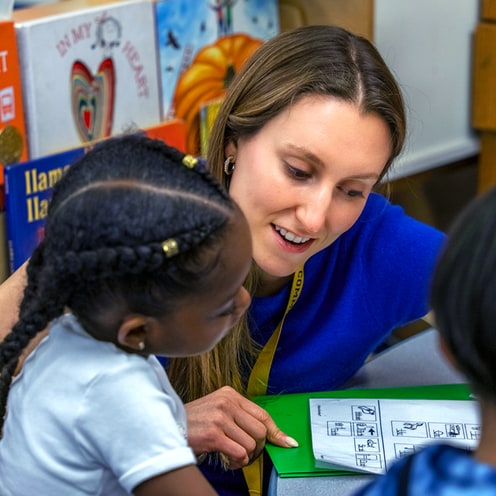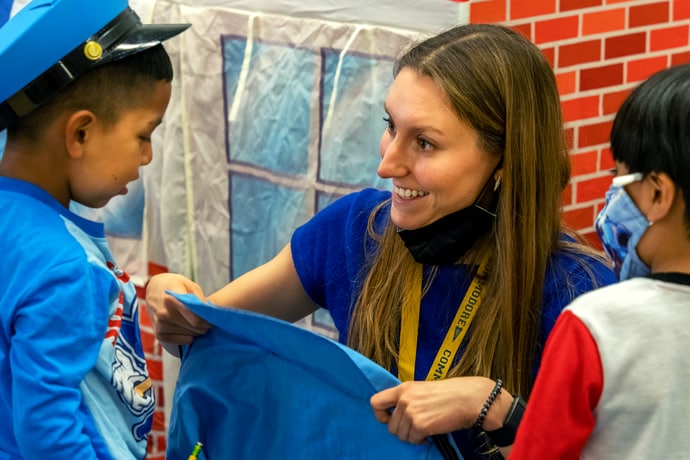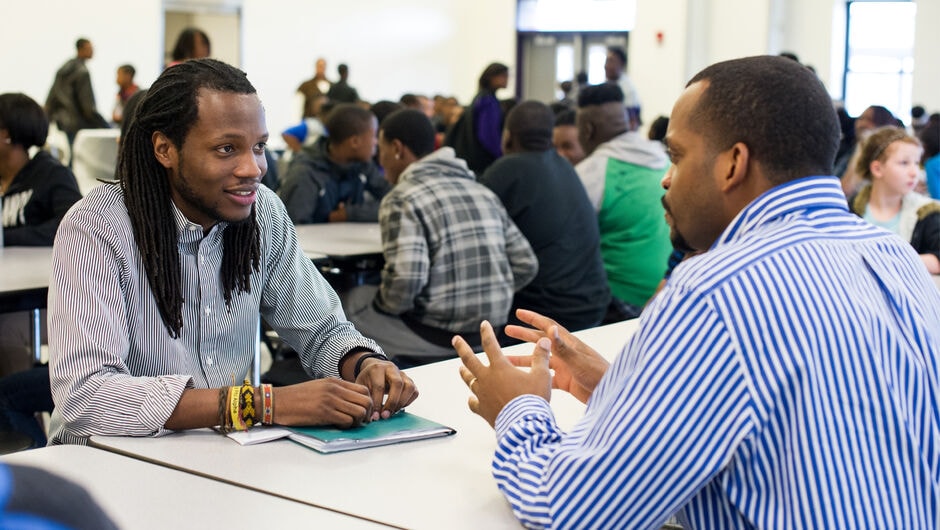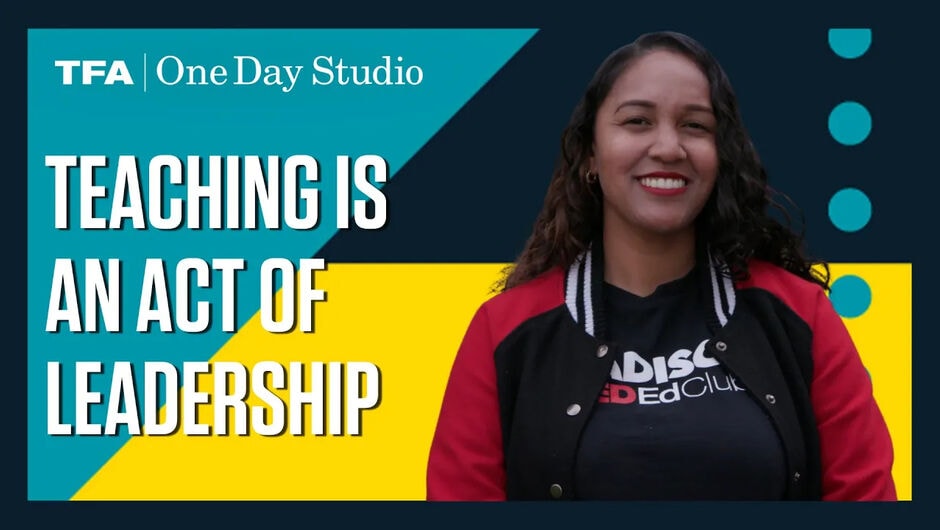
Maryland Teacher of the Year on the 'Unstoppable Power' of Her Pre-K Students
Berol Dewdney (Baltimore ’13) shares her approach to early childhood education and how her students inspired her to apply for the Maryland Teacher of the Year award.
“I am smart! I am brave! I can do anything!” exclaim Berol Dewdney’s students each day in her pre-K classroom at The Commodore John Rodgers School in Baltimore, Maryland.
As an early childhood educator, Dewdney (Baltimore ’13) knows just how important these classroom affirmation rituals are for her students’ healthy brain development. Saying and believing these words create the very conditions of safety and love necessary for students to learn and form important connections with their classmates and teachers.
Dewdney had a head start on these lessons courtesy of her mother, whose work in children’s literature inspired her to become a teacher. “My mom always said that life is about growing your brain and giving your heart so that you can make the world a better place,” Dewdney said. “Grow your brain, give your heart” became Dewdney’s first classroom mantra when she began teaching 10 years ago as a Teach For America Baltimore corps member.
This mantra—along with a decade-plus of neuroscience research on how young children learn best, particularly through play—continue to guide and inform Dewdney’s practice as an early childhood educator. An advocate for rigorous, play-based learning, Dewdney has supported the implementation of play-based learning curricula in 25 classrooms across the Baltimore City Public Schools district.
“Every child in our nation deserves a high-quality early learning experience that's rooted in connection and the science of brain development,” Dewdney said.
This approach to teaching has earned Dewdney the title of 2023 Maryland Teacher of the Year. She is one of two Teach For America alumni who received the honor this year: the other is Deion Jamison (South Carolina ’17), a high school English teacher who was named South Carolina Teacher of the Year.
TFA One Day spoke with Dewdney to learn more about her award-winning approach to teaching, how her time as a Teach For America corps member helped set her on a path of impact in the classroom, and what’s next in her career after being recognized as Maryland’s Teacher of the Year.
I am curious to know how you learned that you won the state Teacher of the Year award. Tell me about the moment when you received the big news.
The Baltimore City Public School CEO, Dr. Sonja Santelises, graciously put together a celebration the night of the announcement, which was broadcasted live on public TV. I remember walking in and I was so nervous. The nervousness was not because I cared about the recognition for me—it was because teaching and serving in Baltimore and elevating the power of my kids is the greatest privilege of my life. And in everything that I do, I want to do right by them. I applied after being nominated because the world needs to hear the power of kids in Baltimore and learn from the leadership and voices of our youngest leaders. My 4-year-old students deserve a national platform and microphone.
I remember this specific moment when we were all going into the dining hall, and I looked out and saw everybody in front of me. It felt like this ocean of people. I saw students’ families, mentors, former colleagues, current colleagues, and so many Teach For America people. And to look out at that family, my professional family, my heart just lit up with so much pride. The anxiety dissipated because it was this moment of just remembering that this is what this work is about. We've already won because we're doing this together. And, you know, regardless of what happened that night, I knew I would wake up and teach my students on the classroom carpet the very next day. I knew that my life’s greatest privilege was, and will always be, elevating the voice of my students.
I would love to hear a little bit about your journey as an educator. Why were you inspired to join TFA?
When I was in college, I worked for Teach For America as a campus campaign coordinator and everything clicked. As soon as I started to learn more about educational inequities, like opportunity gaps, I thought: “How could I not do this? I absolutely have to do this.” And I also recognize that I've always loved children. They're closest to the core of humanity and what it means to love. We lose so much of that when we become grown-ups. And so I was like, if we can just figure out how to lead with the unstoppable hearts that we're born with, the world will be a much better place. That is what I wanted to commit my life to, and that’s what I’m lucky to still work for every day.
How did your time as a Baltimore corps member affect your decision to keep teaching and innovating in the classroom?
The best decision that I've ever made in my life was doing TFA in Baltimore and becoming a teacher, hands down. I met my kids and it sounds really cliche, but as soon as I started teaching, I just fell in love with them and recognized that they're the leaders the world so desperately needs. My students teach me daily that love is a superpower. They’ve taught me who I am and who I want to be. At the same time, especially in my first year, I felt this curricular gap. I felt like I knew in my brain what early childhood education should be, but I didn't feel like I had the tools to make that happen for my students.
One of the pinnacle moments of how TFA has impacted my career, and truly it has at every juncture, was an internship between my first and second years in the corps at KIPP DC Grow Academy. A TFA alumna was the principal there, so I went and shadowed her and supported her work. At Grow Academy, I saw the Tools of the Mind curriculum in action and was blown away. Everything that I envisioned early childhood education should be that I didn't have a blueprint for—play, social-emotional learning, development of self-regulation, joy, art—was happening on the ground with a really high level of efficacy. So I took that summer to grow my brain as much as I could and become strategic about how I could take those tools and specifically the curriculum back to Baltimore.
“I have a dream of every child in our country having high-quality early learning experiences. My life is committed to making that happen at the local, state, and national levels.”
I was awarded permission and helped pilot the program in the district as a teacher coach after presenting research to various stakeholders and fundraising. Then, a few years later, I also took on the role of instructional coach and curriculum lead at my school, The Commodore John Rodgers School. The school is part of the 100% Network of Baltimore City Schools, a network of turnaround schools led by my principal, Marc Martin (Baltimore ’98), who has been the most influential force in my career. His leadership has enabled mine. And by leading early childhood work in Baltimore, I’m not only sustained professionally, but I’m able to serve others exponentially.
Teach For America Baltimore was, and continues to be, the driving force in my growth and ability to serve those I love the most: my students. That’s due to what makes the Baltimore region and community particularly unique, especially when thinking about its needs, its size, and its capacity. Baltimore is an urban city, but it is manageable. I know that whenever I step into any Baltimore school, there are teachers I know and have worked with in some shape or form. There are students I either know personally or who know one of my colleagues really well, and there are parents familiar with initiatives I am currently working on. There is immense power to this type of ecosystem. Within this framework, leadership can grow, ideas can be shared and transformed into something better, and, most importantly, school communities can turn around and become more of what our students deserve.

What is your approach to teaching now? And how has that approach evolved over the years with more experience in the classroom?
Every child in our nation deserves high-quality early learning, from the most critical brain-building years of 0-3, to pre-kindergarten and kindergarten. We've known for a while that self-regulation is important and that play matters, but in the past decade, it's become more widely embraced and understood. Taking that research, I've refined my practice. My framework is basically three things: executive function development, rigorous play-based learning, and heart-centered relationships.
Executive functions and self-regulation—the set of processes that enable us to plan, pay attention, follow instructions, and manage emotional reactions—are essentially like the air traffic controllers to the very busy airport that is your brain. They ensure smooth takeoff and landing of all other learning and living. And so sharing and embedding that development in every activity is really important for kids.
Play is the language of children and they are the experts. Play is about students exploring the world while creating their own. Education is about building the world that we dream of, and that's what we do in rigorous play-based learning every single day. What I love most about it is the authentic joy it fuels. When my student Eshana is pretending to be a zookeeper and feeding the animals with my other student, Kwame, they are developing a myriad of cognitive skills, but their smiles and laughter are also critical indicators that we are doing it right.
And with heart-centered relationships, we know our connections on the outside impact and develop our neural connections in our brain on the inside. And so I'm really interested in building specific practices that empower teachers and students to have really healthy, strong connections that build environments where students and teachers feel safe and loved in order to learn and lead.
Get more articles like this delivered to your inbox.
The monthly ‘One Day Today’ newsletter features our top stories, delivered straight to your in-box.
Content is loading...
It’s no secret that teachers face significant challenges in 2023, including burnout, staff shortages, and low pay, among many other factors. How do you continue to stay motivated as an educator in the face of these challenges?
I think in any context, but especially when there are challenges as a teacher, I think about my kids and the brilliance, the love, and the leadership that they bring to life. When you see and feel their unstoppable power, you find your own. And similarly, when I think about the network that's around me, it immediately makes me think about collective power. I am only me and get to do what I do because of the teachers who developed me, cheered for me, challenged me, and picked me back up when I have fallen down. When you know the power of kids and our collective power, there is nothing that we cannot do. And so my advice is to always focus on the good things happening around you. That is how you see that our story is not one of despair, but one of hope. The progress, the growth, and the joy you see and create will sustain you as a teacher.
What’s next? Are there any new educational programs or initiatives that you are working on?
I have a dream of every child in our country having high-quality early learning experiences. My life is committed to making that happen at the local, state, and national levels.
Fighting for that dream, right now, means I get to do my life’s calling and passion: I get to teach and learn with our littlest leaders, and I get to teach educators. I am so proud to be a teacher, and I’m humbled that I get to wake up and do it every single day. I will continue to find ways to lead from my seat, and what that looks like for me in terms of the exact path, I am not sure. But I know the things that excite me, and I know that the projects that I worked on prior to this whole Teacher of the Year thing are the things that I'm going to keep doing. So whether that's refining my practice in the classroom, serving and learning from my community, expanding the cohort that I lead to more classrooms, or engaging in national research and advocacy, it's all going to be around the power of our youngest learners and high-quality early childhood education.
Ultimately, I want to do my part in fueling national action for our youngest students. As a country we can’t afford to miss the mark of this moment. We can’t just say early learning matters, we have to actually make the investment in getting it right for all children. I want to help America do that. I want to help us reimagine early childhood, from understanding that childcare is early learning, to the importance of executive function, connection, and the power of play.
Finally, what words of advice or encouragement would you share with educators reading this?
My 4-year-old students always have the best advice. I asked Eshana for her opinion this morning, and she suggested that educators do our leadership cheer: “I am ready to lead. You are ready to lead. We are ready to lead. So let’s go, go, go, go!” As you answer that call to action, I offer a phrase from a TFA mentor of mine that has always stuck with me: “Be humble. Be hungry.” There is no true “I made it moment” in education. And there shouldn’t be, because there is no limit to what our students and communities deserve, or to learning or loving. Centering that growth mindset and honoring the knowledge and experiences of those you serve is paramount, but I also think it’s liberating.
This moment in education demands revolutionary action, and it is met by the revolutionary leader in each of us. And the transformation we dream of, the thing we strive to build in our classrooms every day, is not a singular nor glamorous feat. It is a daily commitment to getting better, learning more, and loving truer. I think that is the transformational act: the decision to get up and try again, to choose love over fear, to work towards our dream.
That commitment to daily growth, and the power of love, helps you to know—as my students do—that you are unstoppable. We are unstoppable. Let’s make that our legacy. Let my students remind us: We are smart. We are brave. We can do anything!
Read TFA One Day’s interview with TFA alumnus and 2023 South Carolina Teacher of the Year, Deion Jamison (South Carolina ’17).
We want to hear your opinions! To submit an idea for an Opinion piece or offer feedback on this story, visit our Suggestion Box.
Sign up to receive articles like this in your inbox!
Thanks for signing up!
Content is loading...






